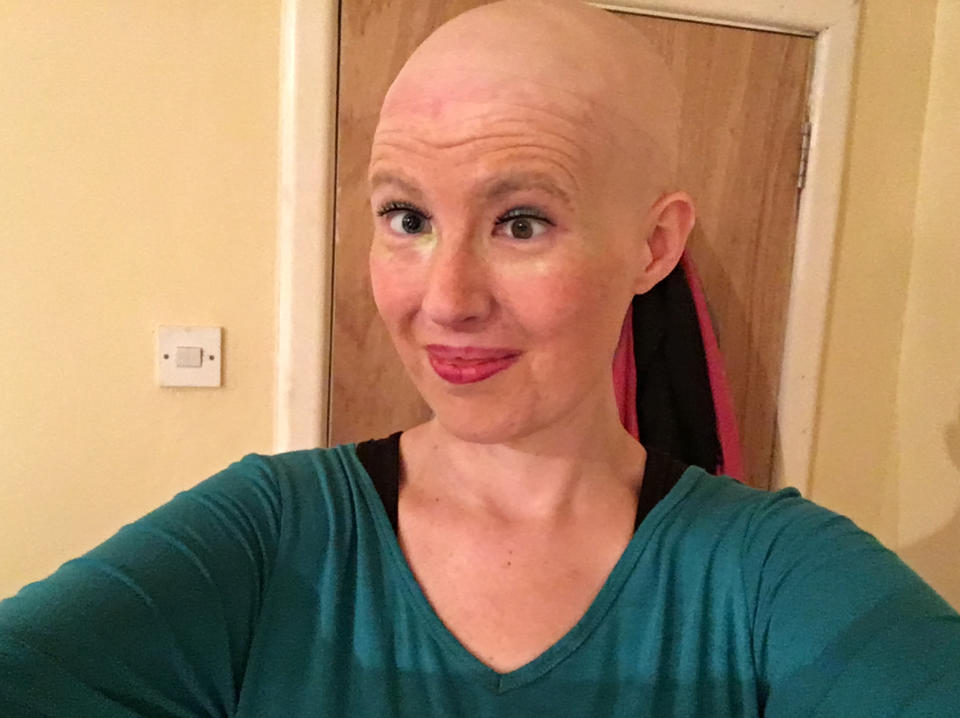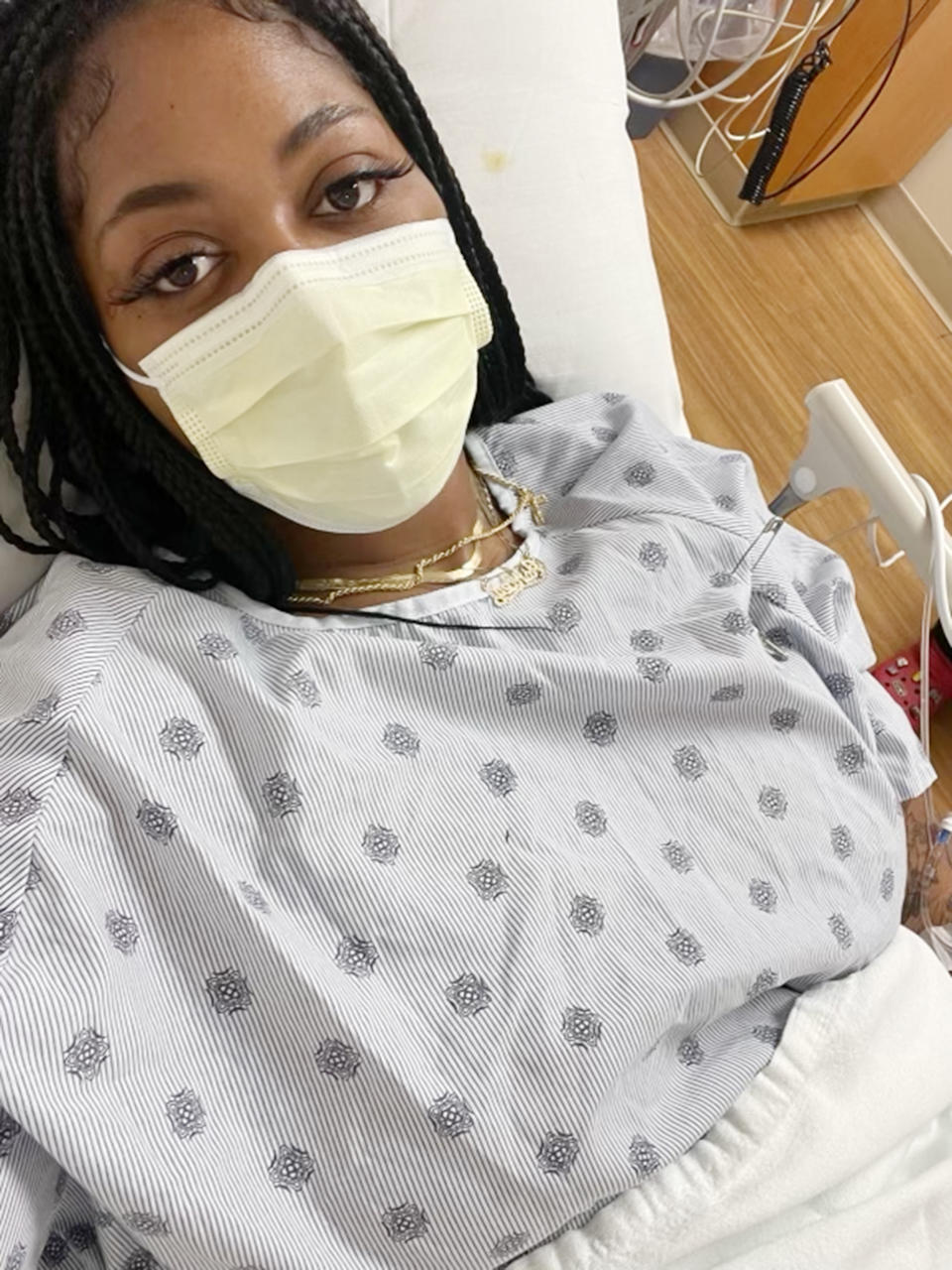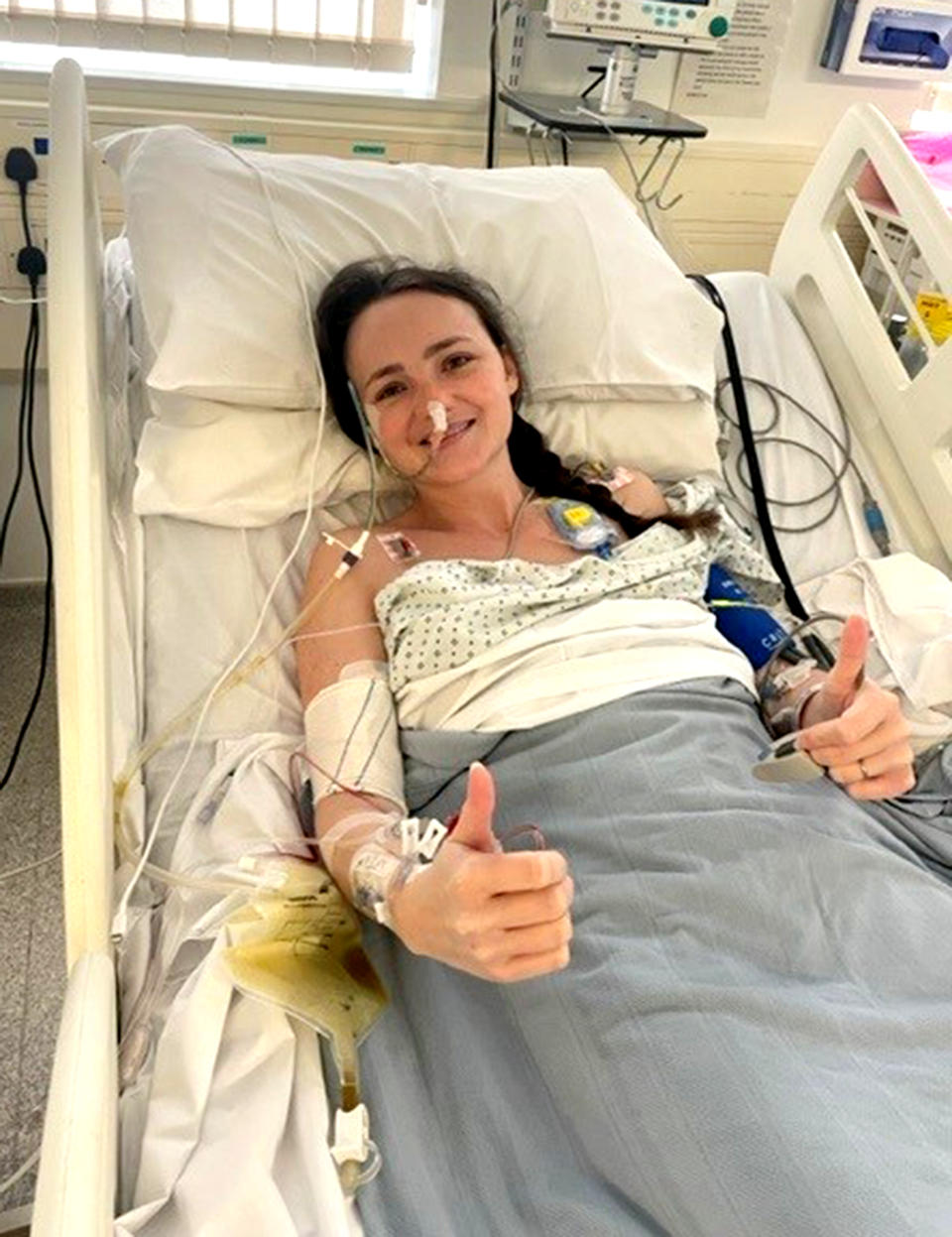Weight loss isn't always a sign of health: 3 women share stories of life-threatening illness
When Sarah Rees Brennan shed a lot of weight and started fainting, she visited her doctor. The physician speculated that she had low blood pressure, which caused her to swoon. But the symptoms persisted, eventually impacting her work as a fantasy writer.
“Suddenly, my sentences became mush,” the 39-year-old author from Dublin tells TODAY.com via email. “Reading aloud, the way the words were strung together wouldn’t even make sense. I was truly more concerned about my mind than my body.”
As she continued to drop more pounds, she recalls doctors having the same response — praising her for her weight loss. Three years later, she was diagnosed with stage 4 non-Hodgkin’s lymphoma, a type of cancer that starts in the lymphatic system.

It's not unusual for patients to bring up unexplained weight loss to a health care provider only to have the symptom overlooked and be told they look well, Rebecca Puhl, Ph.D., deputy director for the UConn Rudd Center for Food Policy and Health, tells TODAY.com.
“The automatic assumption is that if a person is thin, they must be healthy, which is false ... and concerning,” Puhl says. “Significant weight loss, especially among people not trying to lose weight ... can signal a very serious health issue.”
"I was told I was a whole new person."
Brennan usually got sick a several times a year with bronchitis, pneumonia or other conditions, and her doctor would simply treat her for those and send her home. Once, she asked about a rash surrounding her mouth, and the doctor told her it was an allergic reaction, but she was skeptical.
When she sought health care for her weight loss, she was often met with praise, even though she hadn’t modified her habits in a way that would lead to change on the scale, she recalls.
“One doctor remarked approvingly that I was clearly healthy, though I’d basically had pneumonia for a year,” she says. “I was told I was a whole new person. I hadn’t wanted to be a whole new person, but everybody seemed to like this new person better.”
Brennan adds that her general practitioner saved her life by sending her blood samples for testing and helping her secure her lymphoma diagnosis. But even the GP "would have never guessed how ill I was, when I looked so well," Brennan says.
Undergoing chemotherapy caused Brennan to lose even more weight, and she received more praise, even though she was dangerously thin. Naturally, she began developing complicated feelings about how she looked. She took some photos during her treatment and after, when she’d gained some weight.
Years later, she still thinks about those photos.
“I’d love to say I like how I look in the ‘after’ picture, but I don’t,” Brennan reflects. “I look at the ‘before’ picture, and I think I look awful, but I see my stomach is flat. It isn’t anymore, and some part of me thinks it should be. Cancer gave me hang-ups about weight I never had before. ... There was literally no point at which I felt totally satisfied.”

"Praised instead of investigated."
More and more studies have revealed that weight isn’t the best indicator of health, despite what many believe.
“There certainly is increasing evidence showing that people can be healthy at different body sizes and that the conventional use of BMI as an indicator of health is inadequate," Puhl explains. "We have to be careful about making assumptions about a person’s health based on their body size, and this can be on both ends of the spectrum. We cannot assume that because a person has a larger body size that means that they’re neglecting their health, and we cannot assume that a person who is in a thin body is completely healthy.”
Over the past two decades, researchers have been looking at BMI and mortality, and discovered the relationship isn’t what most people think. For example, a 2016 study in JAMA found that having class 1 obesity (a BMI between 30 and less than 35) was not associated with higher mortality compared to people of a normal weight, and that people classified as overweight actually had lower mortality than those with a normal body weight.
The study was led by Katherine Flegal, Ph.D., former senior scientist at the Centers for Disease Control and Prevention. Her work on BMI and mortality is the "gold standard," journalist Virginia Sole-Smith, author of "The Eating Instinct: Food Culture, Body Image and Guilt in America," tells TODAY.com. "(It) suggests that weight does not impact mortality nearly to the extent that we think it does."
But, despite the research, “we live in a culture ... that negatively stereotypes people who have a higher body weight or large body size ... as unmotivated, lacking self-discipline and willpower, and personally to blame for their weight," Puhl says. "Those stereotypes are pretty pervasive and don’t often get challenged.”
As a result, dramatic weight loss is usually seen as something to be "praised instead of investigated," Sole-Smith says, adding that if a health condition is behind the weight loss, it may go untreated. She stresses that this doesn't just happen to people of a lower weight who lose weight and are then praised for being thin: "It especially happens to fat folks who become a little less fat."
“When a fat person loses weight, it is almost universally praised by people in their lives — by strangers, by doctors,” Sole-Smith says. “The anti-fat bias really harms the medical care that fat people can access. ... If I have an underlying issue that’s causing me to lose weight, but my doctor is just so happy that my BMI is … two points lower, then they’re not going to investigate further.”
Weight stigma, which primarily impacts those in larger bodies, can lead people to avoid health care because they may not want to be shamed for their weight or praised for losing weight.
“What the anti-fat bias really wants is to always be pushing fat people to not be fat, so fat folks are the most vulnerable to this problem,” Sole-Smith says. “Anytime we walk into a doctor’s office, the pressure is going to be around, 'What are you doing to manage your weight?' You can walk in for a stuffy nose and expect weight loss talk.”
"I felt disrespected. I felt not heard."
Ashley Teague, 30, of Indianapolis, did seek health care for her unexplained weight loss, but her concerns weren't taken seriously.
After her mom underwent cancer treatments and her uncle died, she reached her highest weight in 2018. At the end of the next year, she started losing weight but thought little of it. Then in 2020, she discovered blood in her stool and visited her doctor.

“I’m like, ‘Hey doc, I’m losing weight unexplainably,’” Teague tells TODAY.com. “They did bloodwork, but for whatever reason, it came back fine.”
By this time, Teague could see that her face looked noticeably thinner, and she felt worried. Her mom has Lynch syndrome, a genetic condition that increases one’s chance of developing many different cancers, including colon cancer. Teague told her doctors this, but they insisted she was healthy.
“I’m trying to subconsciously tell myself like, ‘OK, you’re fine. You look good,’” she says.
But she continued having blood in her stool, and her bathroom habits changed.
“Everything I ate, it could be a kale salad to some fresh fruit to maybe even a brownie or ice cream sundae, like no matter where it was on the food spectrum … within 15 to 20 minutes max, I was having to run to the restroom,” she says.
Googling her symptoms made Teague think she had colon cancer, and she asked for a colonoscopy was but told no.
“(A provider) literally repeatedly to me that I looked fine, and they do not grant 28-year-olds colonoscopies,” she says. “She goes, ‘I’m going to write you a prescription for IBS. We’re going to treat that.’”
Following that appointment, Teague started experiencing side pain that caused her to hunch over, so she went to the emergency room, where she got several scans that found nothing. But after her dad underwent a colonoscopy that revealed cancerous polyps, she was officially considered high risk for colon cancer.
“I said, ‘I’m having the same side pain. I’ve lost more weight. I constantly see blood in my stool now, and I just had a conversation with my father, and he just had cancerous polyps removed from his colon. Is that a direct relative enough?’” Teague recalls. “From that point forward, it (was) like, ‘Oh my God, let’s scramble.’”
Teague was diagnosed with an aggressive stage 2 colon cancer and underwent surgery to remove the majority of her colon. Her lymph nodes were noncancerous, luckily, but she felt stunned that so many people told her she was fine, despite her weight loss and bloody stool.
“I felt disrespected. I felt not heard,” she says. “I didn’t understand. I was at a loss for words, literally.”
"At least you'll never be fat."
Victoria, a 34-year-old lawyer in London who asked TODAY.com to not use her last name, has grappled with people complimenting her dramatic weight loss from Crohn’s disease, a diagnosis she's had since age 15. Crohn's causes swelling in the digestive tract, which leads to stomach pain, diarrhea, fatigue, malnutrition and more.
“I was quite a chubby child, and people would say, ‘Oh it’s puppy fat, you’ll grow into it.’ So, I think people partly thought (when I first lost weight), ‘Oh she’s grown into it,” she tells TODAY.com. “As I got older, I got a lot of comments like, ‘Oh, wow, you look great,’ whilst feeling the worst I’ve ever felt.”

In 2022, Victoria became "emaciated" and “nearly died” after a terrible flare of Crohn’s, she recalls.
“My body was incredibly unwell. I was vomiting 30 times a day some days. I was fed through my veins,” she explains. “There’s literally nothing glamorous about my life at that point, and I’m still getting comments like, ‘Oh, well, you look great.’”

Victoria educates friends and family about Crohn’s on social media. Sometimes, when people compliment her for being so thin, she'll confront them and say an illness caused her weight loss. But even people who know how sick she is have complimented her body.
“A comment that I’ve heard a lot of times is, ‘Oh well you’ve got Crohn’s disease and that sucks, but at least you’ll never be fat,’” Victoria says. “I just find it an utterly bizarre thing to say.”
As Victoria, Teague and Brennan have all seen firsthand, people are too quick to believe being thin means a person looks "great" and "everything (about their health) must be fine," Puhl says. "That’s a very dangerous assumption to make."
This article was originally published on TODAY.com

